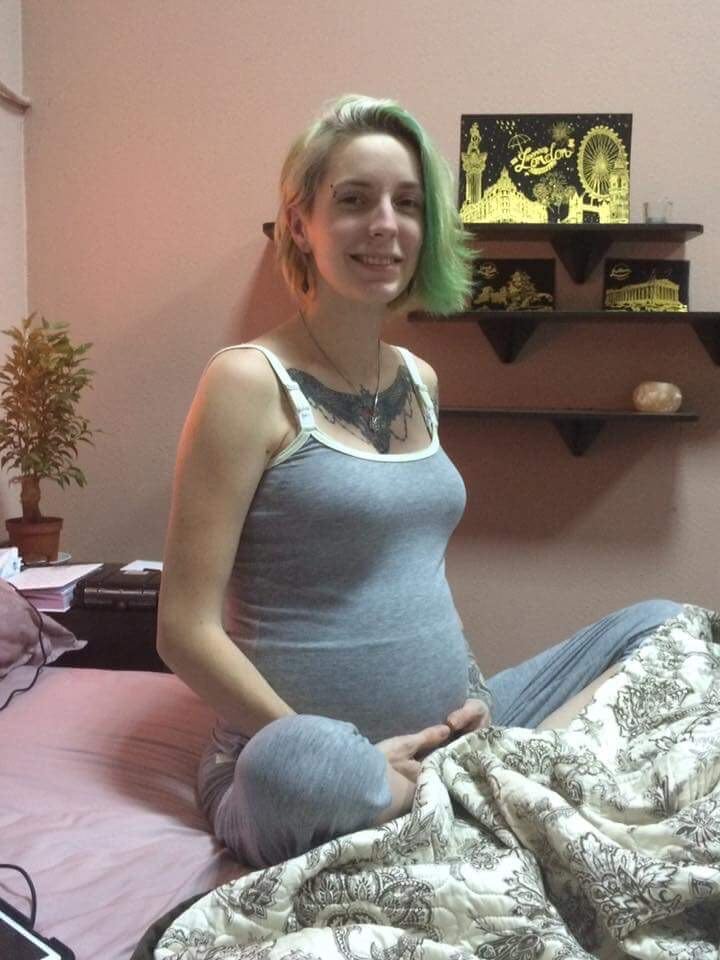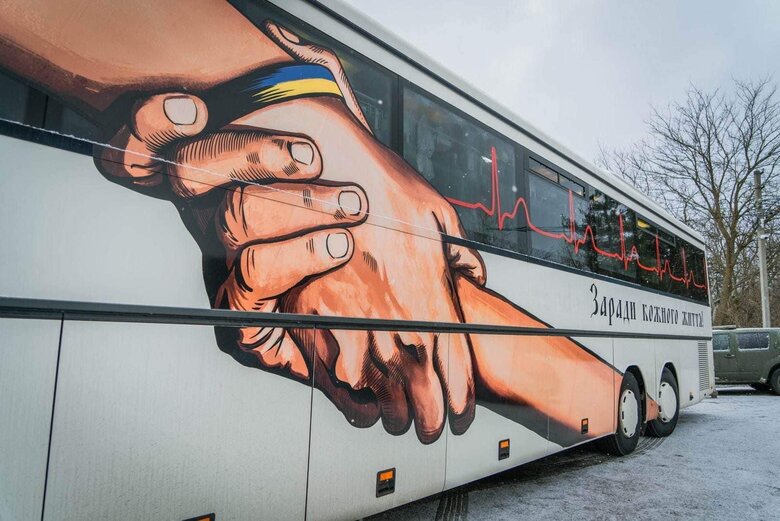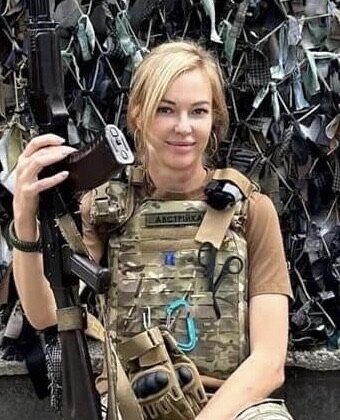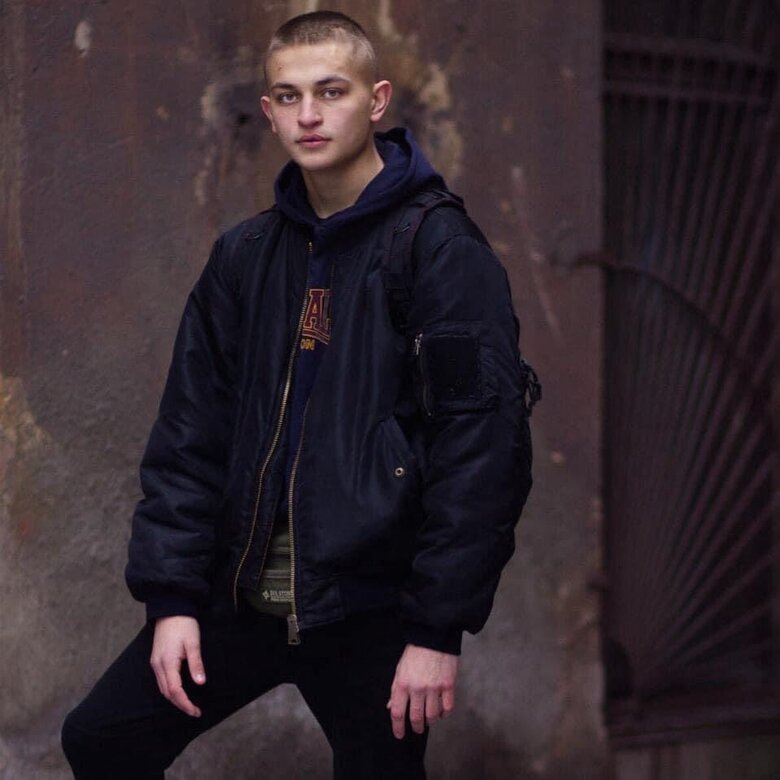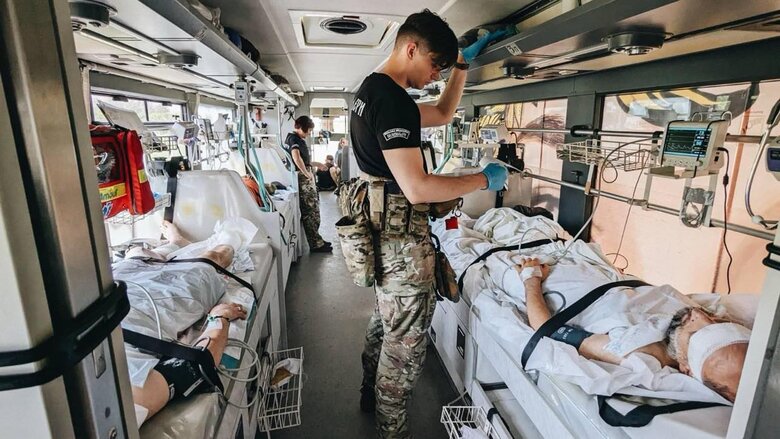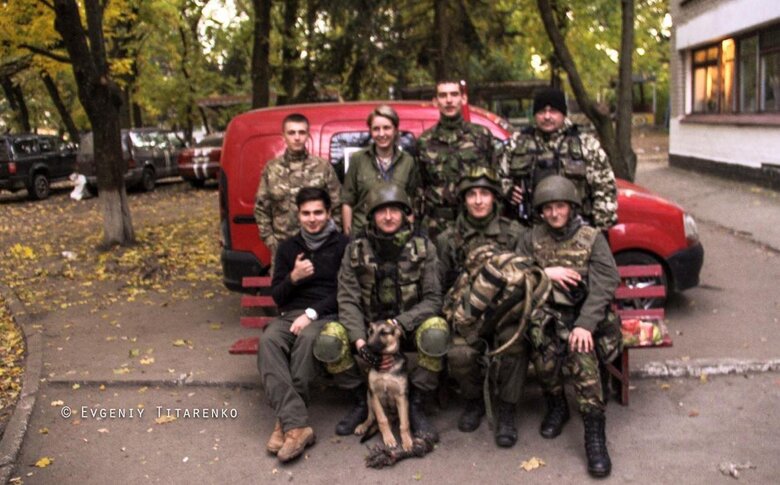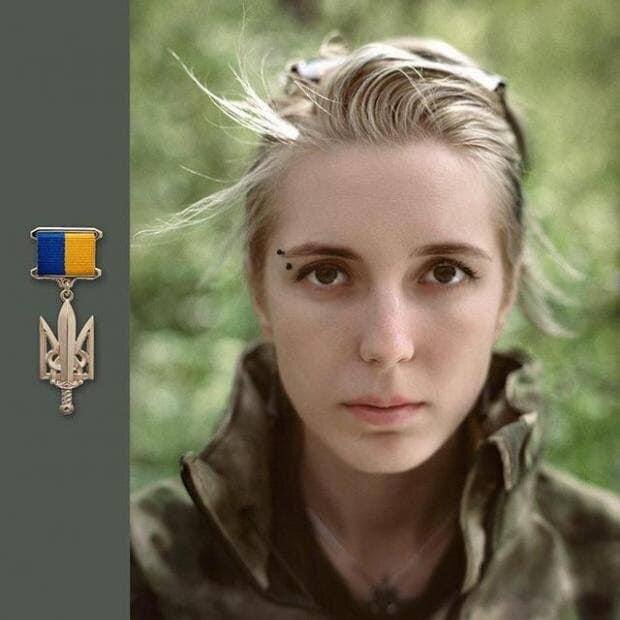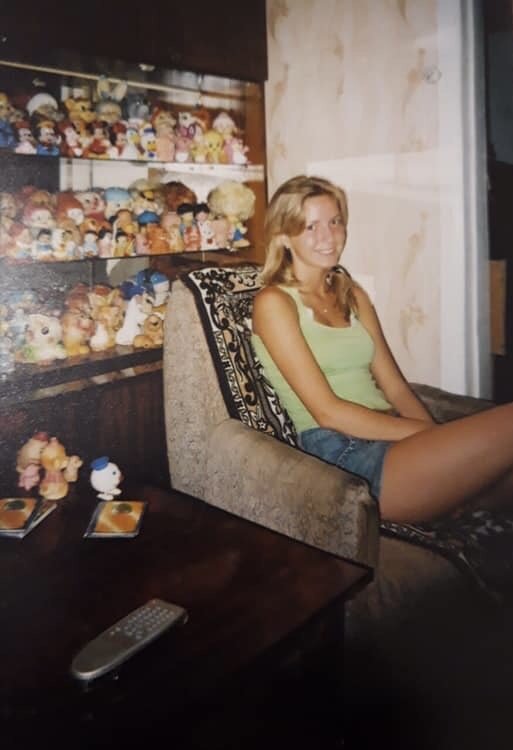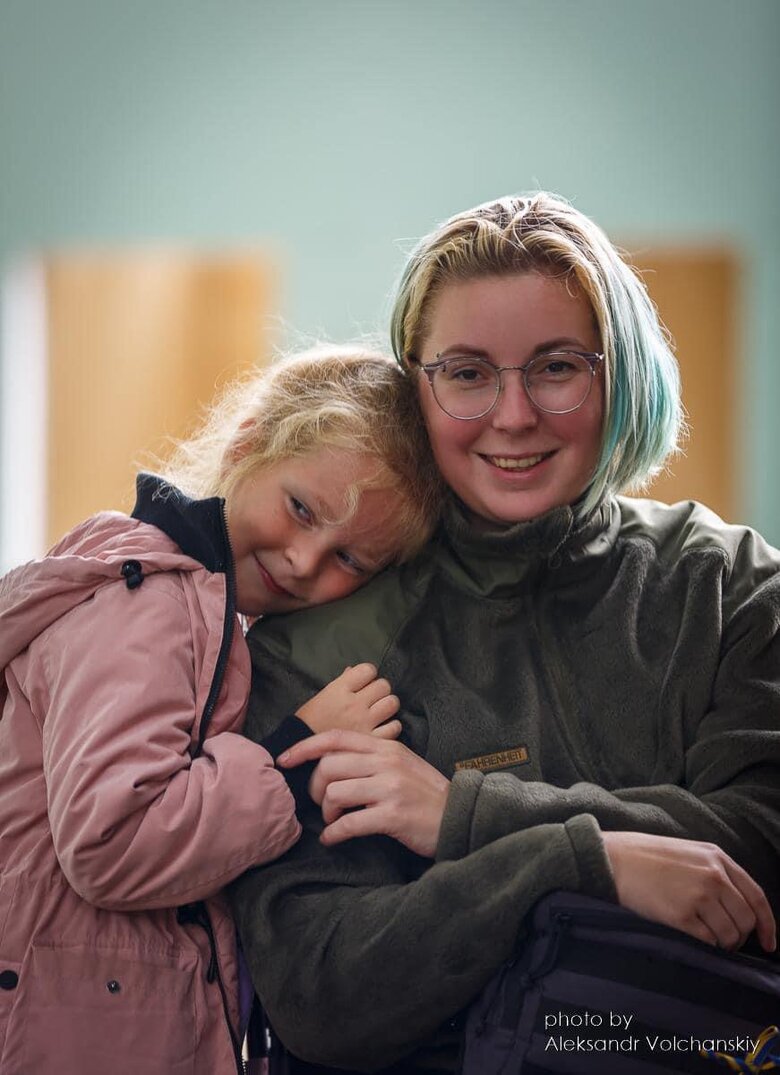Yana Zinkevich, founder of "Hospitallers" volunteer medical service: "Our unit has evacuated 23,000 wounded throughout war"
Yana is a legend of this war. And this is no exaggeration. Perhaps even this word is not enough to convey the depth of what Yana has done for the country and continues to do for our Victory. Talking and remembering those who went to war from Maidan as children, we noted with great sadness that there are very few of them left. And Yana is one of them.
The 10 years of war, in fact, shaped Yana as a person, an organiser of a powerful medical movement. They crystallised in her the same character and iron will that kept her going after she had a terrible accident and suffered a spinal fracture that left her unable to walk. When this happened, it seemed that Yana would not be able to fully return to managing the unit. But she continued to manage the Hospitallers while still in hospital. Only she knows what it cost her. And this is despite the fact that she was carrying a child at the same time!
When Yana was offered the chance to try her hand at politics, she agreed. She won the election and has been a Member of Parliament for almost five years. In other words, she has been implementing the very thesis that "the country should be built by those who fought, who saw the war, who will return from the frontline". The only thing is that Yana has not yet returned from the frontline. She is constantly on the line of fire. In every sense of the word.
"DURING THE YEAR, THE BUS NAMED AFTER THE FALLEN AUSTRIAN WOMAN TRANSPORTED 3,996 WOUNDED, AND IN TOTAL, OUR UNIT TRANSPORTED 23,000 WOUNDED DURING THE ENTIRE WAR."
Yana invited me to the base of her unit near Kyiv, showed me how it was equipped and allowed me to tell publicly what and how the medical volunteer service is organised. This is how we started our conversation.
- "These containers contain frozen products," Yana shows us. "The next containers are for medicine, tactical medicine, ammunition, and food. Each warehouse container has a separate name. As you can see, there is a sorting area nearby. When the cargo arrives, it is first sorted here, everything is sorted, and then scattered into warehouses. There is also a crew loading area to make it as convenient as possible and, if it is raining or cold, so that people do not get cold or wet.
- Do your teams have rotations?
- Every two weeks.
- Why two weeks?
- This is the optimal period for people to take time off from work or school. It's not a big deal to miss two weeks. And those who have worked together in crews agree on a certain period and travel together.
- Do you have enough people?
- There are not enough doctors. In general, we have a long queue to join the battalion. We didn't take anyone for six months, so the queue has grown.
- Do specialists come too?
- Now there are fewer. Most of them are either already in our ranks or have already decided on their place of service.
- Only your service has a whole evacuation bus that can transport several dozen wounded, and seriously injured, at the same time. Who came up with the idea to make such a bus?
- Me. We were given a bus that used to be used for vaccination. In Germany or Austria, it was used to visit villages and small towns. It was immediately equipped with beds. People would lie down and get vaccinated. When I saw this bus, I thought: aren't these intensive care beds? We just needed to equip it with additional equipment, and we did that. It has breathing equipment, cardiac equipment, and a patient monitor. Each bed is equipped with oxygen, and there are several beds with artificial lung ventilation. So we can carry light, heavy and medium patients. We transport 20-25 people per flight.
- Were there any skeptical doctors before your first visit?
- At first, it was difficult to perceive this bus. Especially after it got into an accident. Some people blamed our driver, although he was not to blame - that KrAZ was standing in the middle of the road in the dark.
- How did this happen?
- The bus was on its way to the exit of the road, it was still a safe area, and there was a KrAZ truck with no lights in the middle of nowhere... Our driver dodged to the left as much as he could, but still, the bus on the right side was all torn up. At that moment, Austrian - the call sign of the girl who was lying on the bed, resting on the road - hit her head and died...
In the photo: Natalia Yatsun (Frauscher) in the "Hospitallers" unit had the call sign Austrian because she came from this European country, where she lived with her family for many years, to help Ukraine during the full-scale offensive. On 26 June 2022, she was killed. The evacuation bus that transports wounded soldiers every day was named in her honour
- How long did that first bus last?
- He managed to work for maybe a month or two.
- How many of your soldiers died during the war?
- 24 people - we also take into account those deaths that occurred in civilian life, under other circumstances. These are different people - those who were medics, paramedics, drivers.
We pay attention to their families and keep in touch with them.
The situation with Austrian is very painful for me. I also keep thinking about Smurf. He was the youngest soldier among those who died - he was only 20 years old. It happened near Mariupol in the village of Vodiane. He was seriously wounded in the head, and our crew managed to evacuate him to Mariupol. Later he was taken to Dnipro and died there a few days later...
Mykola Volkov, friend Smurf, was a volunteer with the "Hospitallers" unit. He was born on 25 February 1999 in Mariupol and died on 15 April 2019 after being seriously wounded in Vodiane near his hometown.
- I remember the whole unit was shocked at the time.
- Yes, he was our golden boy, and it was very hard to lose him.
The Hospitallers suffered more losses during the interview.Serhiy Kaznadiy, a friend Hera, and Oleksandr Kucheriavenko, a friend Kuzma, were killed while performing a mission. "Heroes die saving others," Yana wrote on Facebook, talking about her comrades...
On 5 May, Serhiy Kaznadiy, a friend Hera, was killed in the Avdiivka sector...
...and on 14 May, the Russians killed a combat medic, Oleksandr Kucheriavenko, a friend Kuzma, when he was being evacuated.
- Why were you so sure that a second bus was needed? That it was necessary?
- Firstly, we could not forget Austrian, we had to do it in her honour. Secondly, I understood that such a bus does a lot of work. "The ambulances that transported the soldiers were not good: they were broken and not equipped. I just felt sorry for the soldiers who were travelling in these vehicles. Sometimes they had to travel for five or six hours to Dnipro or another city. Our bus is more comfortable, and the soldiers needed it.
- And did it pay off?
- It fully justified it. It is working quietly now. Fortunately, we have not had any more incidents with him. And the doctors saw the condition of the soldiers they handed over after we transported them: all stabilised, calm and well fed. Very often, we helped fighters who hadn't even eaten for three days, because they couldn't. And the bus has snacks for them. We need to take care of this as well. Because when a person eats, he will fall asleep easier and calm down faster.
- And doctors have to eat something...
- Doctors don't eat on the flight - they don't need to, and they don't have time.
- Do resuscitators and anaesthetists work on this bus?
- Yes, these are the specialists. And this bus, named after the fallen paramedic Austrian, has already carried 3,996 people in a year. Soon it will be four thousand.
- You've been keeping statistics carefully since 2014. How many wounded did you help in 2022? And how many wounded did you evacuate in the two years of the full-scale attack?
- Before the full-scale war began, there were more than three thousand wounded whom we evacuated. Now this number has increased to 23,000.
We are walking further around the base, and I see a guy lying on a bunk under a tree. He has a neck brace around his neck. He has a tourniquet on one leg. Next to him are two young men in uniforms with chevrons "Hospitallers". They are quietly talking about something, one of them shows and comments on something...
- We also provide instruction for the unit's medical staff, and we have courses for everyone. Our instructors are constantly taking advanced training courses and improving themselves. They have everything set up precisely.
- Can you tell us how many vehicles you have working directly at the frontline?
- Sixteen.
- You said that the brigades are not only on duty at the staging posts where the wounded are brought from the front line, but also take them directly from the line of fire. Why do you have such access to the trenches?
- We work with each team individually. In some cases, we have access to the red zone, in others - to stabilisation points. It all depends on the unit. We are ready to work in different areas. We have people who agree to work in the red zone, and they don't see it as a threat, they are calm about it. And there are people who are ready to work at stabilisation points. There is a person for every job.
- You yourself have known since 2014 that a red cross on a car or bulletproof vest becomes a target for the enemy.
- Yes, medics are primarily targeted by the Russians. Because if a medic is killed, the entire unit understands this loss: now there is no one who can help them. And this is extremely difficult for everyone. That's why we try not to mark ourselves, not to identify ourselves in any bright way. But sometimes the situation and circumstances make it clear that we are medics, because we go to a certain area of the frontline, for example, after a shelling or there was information about wounded on the radio, so the Russians understand this and fire at all vehicles as much as possible.
- How are you perceived in the army?
- They are already used to us. There are a lot of new teams that have not heard of us, of course. Those who have been working since 2014, of course, know us all. And those who have come now, as a rule, have not heard of us. But we are gradually informing them that we exist, that we are working, that we can cooperate and help. Our crews are working both at the staging areas and at the frontline, including in the trenches.
"TWO OF OUR SOLDIERS WHO WERE ON DUTY IN MARIUPOL HAVE BEEN IN CAPTIVITY FOR TWO YEARS"
- Tell me, are they afraid of you as a commander? Or do they respect you? How do you feel?
- It is better to be respected than to be afraid. Although old people are afraid - when I was younger, I was more angry, more... spiteful (laughs). But over the years, it's gone.
Yana shows us a cosily furnished dining room, a small vegetable garden and a private beach where people can relax between study and work in the summer. There are also rooms where doctors can live comfortably between rotations.
- Are there many who are fully committed to the "Hospitallers" and have left their civilian jobs?
- There are those who work only at "Hospitallers".
- How then do you support them financially? After all, your unit is almost the only one left that is volunteer. The same as it was back in 2014.
- Some people had a financial cushion. Some are supported by their families, some by friends. We really do not pay our fighters. We have not had such a practice in all ten years. And we still maintain the volunteer principle of our unit.
Now, during the full-scale invasion, we are trying to work according to combat orders, which are the official orders that we are officially involved in. This gives our fighters the opportunity to get a status at some point. But BRs are very rarely issued. We work more on a voluntary basis, as it has always been.
- Why did you choose this path - not to go to anyone else? It's quite difficult to provide for the unit yourself for so many years.
- This means independence, autonomy, the ability to quickly carry out rotations and change locations. Not being dependent on anyone is extremely important to us. No one here is chasing status. If we have it, great. If it doesn't, then it won't, no one is chasing it.
- Do any of the hospitalists have any state awards?
- There are awards "For meritorious service", "For saving life", and so on.
- How did you manage to achieve them?
- We submit petitions to the Ministry of Defence. Sometimes they are granted.
- What awards do you have?
- "For Merit" of the II and III degrees.
- Did you get your second degree during this period, since 2022?
- No, before. Now I'm a deputy, so I don't get anything. Not in that party...(laughs).
In 2015, Yana Zinkevych was one of the first to receive the highest non-governmental award, the silver trident "People's Hero of Ukraine". Photo: Roman Nikolayev
- Did your soldiers have to shoot back and take part in combat?
- In 2014, when I was still a fighter. After that - no. We were storming different settlements then. I had to take direct part in those battles all the time. That's why I was a shooter first, and then a medic. But we all undergo training with weapons. As the war has shown, any situation can happen. Three of our medics were taken prisoner in Kherson region, and four in Mariupol.
- Have they been exchanged?
- Not all of them have been released yet. Two guys - friend Dream and friend Bison - have been in captivity for two years.
In addition, we take fighters from the battlefield with weapons. They need to know how to handle them.
- Can you remember a situation when you had to shoot? Where was it?
- In different areas: in Pisky, Pervomaisk, Avdiivka, Stepanivka. This is all back in 2014. I joined the Right Sector as a fighter. On the Maidan in Kyiv, I was involved in various actions, including as a medic, because I was planning to enter a medical university. But I had no first aid skills on the Maidan. And I came during calm periods, as it happened. And when the fighting started in Donbas, I was not a medic in the unit. I helped as much as I could. I had to cook food - I cooked, practised medicine, trained as a fighter. Then, when the first battles took place, I joined as a medic. Once, in 2014, in Pisky, a lot of people gathered in one basement during the shelling, including a priest. He started telling different stories, including about the Templar Order or Knights Templar. And then he mentioned the Hospitallers. That's when I made a wish: if I survive, I will create a unit and call it the "Hospitallers". It will be engaged in medicine and evacuation of the wounded. And so it happened. Yarosh appointed me head of medicine. That's how the "Hospitallers" were formed, and the first crew started working. Then our numbers grew and grew, and we gradually grew to a battalion.
- And how did you have the confidence at the age of 18 that you could organise a whole service and manage older people? How did you know it would work out?
- There was no confidence, but there was initiative, there was an opportunity to show my leadership. And I showed it as much as I could.
- And before that, did you feel like a leader? Did you know who you were?
- No, I didn't. I was a quiet child, of course, an informal one, but I had no organisational skills or leadership qualities.
- Didn't you rally your peers around you at school?
- No, there was nothing like that.
"I STARTED PREPARING THE UNIT BEFORE A FULL-SCALE OFFENSIVE IN... APRIL 2021"
- You have been at war for ten years. You grew up in the war, you were formed in the war. Your conscious life as an active woman took place during the war. How have you changed? What have you learnt about yourself over these ten years?
- First of all, I grew up in this war, saw my true capabilities - what I can do, what I am capable of. What I am ready for, what challenges I am up to. Over these ten years, there have been many different periods. There were moments when I gave up, but still, I saw that people were following me, and so I realised that I could not leave them and stop the work I had been doing for so many years.
- You knew for sure that there would be a Russian offensive in 2022...
- Yes. I was preparing. When Russian troops began to gather near the border, which started in April 2021, we realised that we had to get ready. We actively raised funds, bought helmets, armour, medicine, backpacks - everything we could. I did my best, it was simply impossible to do more because we didn't have enough resources. I had all the people in the regions prepared. Everyone knew who was going where, how to get there. Everyone understood who had to do what. Although at first the majority did not believe in the offensive, only a few did. But everyone was preparing.
- How do you have such confidence?
- I guess it's a gut feeling. Over all these years in the war, my intuition has developed a lot, I feel certain events that can happen, I feel how the situation can develop further. That's why I trust myself.
Such thorough training enabled us to get involved immediately and work in many areas. We were one of the best-equipped medical units at the time. There was no one better than us. On the contrary, we shared with others, our hub in Mykhailivske was open to everyone. A large number of people from different units came to us, we gave them ammunition, medicine, we even just dressed them, because many of them had no uniforms, nothing. And in the first days of the full-scale offensive, I bought everything we needed for several million from "Militarist". I must have been cursed by the whole of Kyiv at the time, because I looted the store completely.
First I bought for 300 people, then 200, then 300 again. This was all in the first week. So we raked the entire warehouse to the ground. But we had everyone dressed and equipped. I also dressed all the soldiers who came to us.
- Do you remember from which direction you took the first wounded? And how much of a shock was it for you that the Russians did advance on Kyiv?
- There was absolutely no shock. I knew, I felt until the day before, that it would be around 24-25 February. I also keep spurring my husband on because he didn't have time to pick up the sleeping bags on the 23rd, he decided: "I'll pick it up tomorrow". Although I told him to pick them up sooner. Those sleeping bags stayed at "Nova Poshta" until the end of March, and then they were finally given to us.
- Did you have a lot of sleeping bags?
- Yeah, it's okay (laughs). And the first wounded came from the direction of Hostomel. That's why we immediately started working in that direction. We worked with a few crews at first, then with more, and then we set up a stabilisation point. The wounded were different. There was a large flow, but we managed to cope.
- Did you sleep the first week?
- Actually, no. I would wake up at five or six in the morning and start working, and go to bed at twelve or one in the morning, when it was already dark and just too cold to work. Most of the work took place outside - crews were being formed and so on. This went on for probably the whole of March. There were a huge number of calls and messages, I had to work live with my team all day, and then sit down and reread, answer messages, contact people who wanted to help or wanted to join us. Every day at nine in the morning I had interviews with those who came to our unit. They came to the headquarters and waited for me, and I talked to each of them about joining the battalion or otherwise joining the work. So March was very busy.
- Your work ethic is legendary. That you can work all night, that you can concentrate. Even immediately after your treatment in Israel, when you returned, you were already pregnant, but you continued to do all the work in the unit. Is this a skill?
- I didn't have this at school. I also had no experience between school and the war - I went to war right after school. I guess it's just a character trait. I still have it, but now it's less pronounced because I'm just getting older..." said 28-year-old Yana, and we both laughed.
"THE FACT THAT I SURVIVE IN ALL CIRCUMSTANCES LIKE A CAT IS A MIRACLE"
- Tell us what happened this winter, why the doctors had to put you in a medically induced coma.
- It all started in autumn. I had health complications after stress. I had an intravenous drip, and during the procedure, an infection was introduced into my bloodstream. I went into septic shock. They had to put me into a medically induced sleep, and I spent a month in that state. I was given antibiotics, and my organs began to fail one by one. There was a great risk that I would die. There was very, very little chance of survival. But, apparently, my inner potential manifested itself. And although I was completely out of it, I still overcame it.
-Do you remember the moment when you woke up? Or did you wake up and go back to sleep?
- Perhaps the first thing I felt was fear. Because when you wake up after a medically induced sleep, you're a little bit afraid. Because you haven't had any stimuli for a month, and it's hard to adapt. But, in principle, I was back to normal in a week. Of course, I was very depressed because I had to relearn how to sit up in bed and turn on my side, because all my muscles had atrophied. I lost 10-15 kilograms, all my muscles were gone. It was extremely hard, and it caused me to feel deeply depressed. After the hospital, I spent another month in intensive care and went to rehabilitation. There, I got a little bit more active, and I felt better. I started to be more independent, and my mood also improved.
- But the surprise of it: "Oh, I'm alive, thank God!" - was it?
- The realisation that I could have died came later.
- It's not the first time you've been on the verge of...
- This is the second time. But if you count the different moments, it's probably more. It seems that I still have some unfinished missions in my life, because I am brought back to life again and again.
Now I try to take more care of my health. Before that, I was so busy that I was constantly postponing my own visits to doctors... Everything was postponed, I didn't focus on my health. Now everything is different.
- How important is the fact that you have Bohdanka?
- Bohdanka is my responsibility. She needs me. No one will ever replace mum. Although my mum and stepfather are wonderful, they take care of Bohdana. But I understand that a mother is still a mother, she has to be in the child's life. So, when it's hard for me, I find the strength to move on for her sake.
- Is she already a first-grader?
- Yes, she is finishing the first grade. She and my mother are always in Rivne region. It's much safer there than here in Kyiv, so I'm not worried about her.
- During the first, acute period, did they go abroad?
- We had a plan for this. We had prepared a house for my mother in western Ukraine, where they were supposed to go. Plus, there were options to go abroad, so my stepfather sent them and also joined the battalion three days after the full-scale war started.
- Is your stepfather also a fighter in your unit?
- Yes, he is in charge of the vehicle fleet. All cars, refuelling, fuel cards are his responsibility.
- You said he was wounded...
- Yes, he was wounded when Kyiv was almost surrounded - a bullet wound to the arm. But he quickly returned to us after treatment. And now he is with us all the time.
- What is the biggest miracle in your life? Can you say that about Bohdanka?
- I guess I can," and after a short pause, Yana confidently adds, "Bohdanka is the biggest miracle in my life.
- It seems to me that you have had other miracles. And they continue to happen to you.
- Perhaps the fact that I survive like a cat in all circumstances is also a miracle. I try not to test my luck, but it just happens.
"ILLIA LOVED ME JUST THE WAY I AM"
- Another important event is about to happen in your life. During the war, you not only lost or found yourself as a manager and organiser, but also built your own personal life.
- Yes, I met a man with whom we will soon be building a new family. We have been together for six years, and Bohdanka considers him her dad. And Illia and I are getting married soon.
- It was obvious to me that it had to be a fighter from your unit. But no. Where did he come from?
- He was not from our unit, he was a scout, he served in one of the infantry units.
- How did you meet?
- During one of my rotational trips to the frontline. We were on our way to Shyrokyne. This is a friend of my former driver. Hans offered him a ride with us to have some fun. Because he had just been discharged from the army, he was sad (smiles). He had left the army just two months before. We immediately hit it off and got together in just a few days, and started living together. Illia helps me, takes me to work, to meetings, to various events every day. He takes me on rotations when I go to the front line. In other words, he is always with me.
- I'm sorry for the next question, but when you met, you were no longer walking. Was there a moment when you gave up on yourself? "I'm not going to have anyone else, because no one needs me like that"?
- I did have such thoughts. I thought that I would never meet anyone after my divorce, because after such an experience, I didn't want anything anymore. And my disability... I had fears: who would love me like this? There was such self-flagellation. But Illia managed. And this did not become an obstacle for him. He loves me the way I am.
- Are you planning a wedding? I don't think there was a first wedding, but there was a proposal on a live TV channel. Did you overestimate the publicity of such a relationship?
- If the marriage had been successful, then perhaps this experience would have been positive. And publicity would not have hurt in any way. But, unfortunately (or fortunately? I would say fortunately), the marriage didn't work out, so the experience was not very pleasant. Now we are not planning anything loud, we will meet in a narrow circle of family and friends. It will be as quiet as possible. I can honestly say that I am looking forward to it. And I am sure that this experience will be positive. I feel like a happy woman in love.
- You have been in a wheelchair for eight years. How adapted are our cities for people like you? Every year we have more and more people on prostheses. Is the world changing to meet their needs?
- Unfortunately, I see that our cities are completely unsuitable. And the smaller the city, the more unsuitable it is. Big cities have started to adapt at least a little bit, there are some crosswalks, markings for people who cannot see. But this is still a very, very small percentage of crosswalks and sidewalks. I understand that this is not changing for the better yet. Even I can clearly see that without an escort, I would not be able to move around Kyiv in peace, because you constantly run into steps, or a building without a lift, or you still have to climb the steps to get to the lift.
- Sometimes journalists ask the following question: what would you change in your life? Have you ever thought about how you would like to live if there was no war?
- To be honest, I have never imagined what would have happened if there had been no war. It's hard for me to imagine. It is even impossible to imagine, I would say. I do not regret my experience. Yes, of course, it's hard that there is a war, that it takes lives, that every day is a test for each of us. But this is my experience, and I am grateful for it.
- At the base, I saw people who came to serve and study with you in your unit greet you and shake your hand. Do you feel like a legend at all?
- I don't. I have never felt popular or famous. Of course, sometimes there are echoes of this: people recognise me on the streets, approach me, thank me. But I've never had this feeling inside.
- Of those who came to the war in 2014 as eighteen-year-olds, I think there are only a few left...
- Yes, there were a small number of us then, and there are few people like me left.
Violetta Kirtoka, Censor. NET

